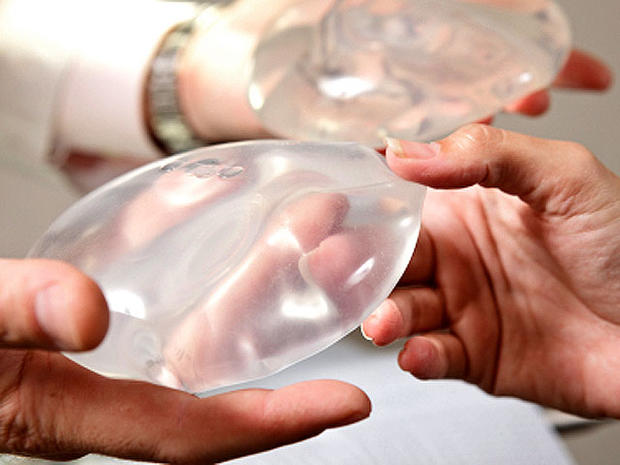Consumer group questions FDA over breast implant safety
(CBS/AP) Breast implants were deemed safe by the Food and Drug Administration last year. Now, consumer safety advocates are questioning the FDA's affirmation, saying the agency used incomplete and erroneous data.
PICTURES - Breast implants: Where they're biggest
The FDA concluded last summer that the silicone-gel implants are safe as long as women understand they come with complications. More than one in five women who get implants for breast enhancement will need to have them replaced within five years, the agency's report said.
An outside panel of physicians affirmed the FDA's decision that the devices should remain available for both breast enhancement and reconstruction. But the National Research Center for Women and Families says the FDA did not present information that showed women reported lower emotional, mental and physical well-being after implantation. The group also questions why figures presented by the FDA appear to show implant complications declining over time. On the contrary, the implants are known to fail over time.
"This shows problems with the data, since the complication rates are reported to be cumulative and should therefore stay the same or increase over time," Diana Zuckerman, the group's president, said in a letter to the head of FDA's medical device division.
When the FDA reviewed the initial applications for the devices in 2005, women using Allergan's implants - one of the two manufacturers studied by the FDA - scored lower on nine out of 12 quality-of-life measures, including mental, social and general health. Women did report higher scores on measures of sexual attractiveness-body esteem.
Women implanted with Johnson & Johnson's implants, the other manufacturer studied, also scored worse on measures of physical and mental health. In the 11-page letter, Zuckerman questions why that information was not presented at FDA's public meeting in August.
"Breast implants are widely advertised and promoted as a way to increase women's self-esteem and positive feelings about themselves," said Zuckerman, in an interview with the Associated Press. "But the implant companies' own data, which the FDA made public in 2005 but ignored last year, shows the opposite."
Breast implants are known to rupture and break down over time. But Zuckerman points out in her letter that the company data seem to defy this trend, with complication rates falling over time.
For instance, Allergan's reported rate of swelling among patients fell from 23 percent in 2005 to 9 percent reported in 2011. Rates of scarring similarly fell from 8 percent to 4 percent.
"This again raises questions about the accuracy of reporting, and whether patients with complications were excluded from the 10-year sample," writes Zuckerman.
FDA staffers did not immediately respond to a request for comment Thursday.
The timing of the consumer group's announcement comes as Europe and South America areembroiled in a scandal caused by French-made breast implants that were made with cheaper silicone, causing them to rupture for many women, CBS News reported. France took the extreme step of telling the 30,000 French woman with the implants, made by Poly Implant Prothese, to get them removed on the country's dime. The implants in question were also implanted in women from Argentina, Venezuela, and the U.K., among other countries.

